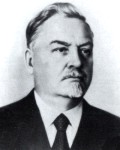Joined the RSDRP(b) (Bolshevik) party in 1917; served as a secret police (Cheka) officer (1918-1922) responsible for transportation; member of the executive board of the Elektrotrest (1922-1927); director of the Moscow Electrical-equipment Factory (1927-1931), earned his reputation as an outstanding manager; entered the state service as chairman of the Executive Committee of the Moscow Soviet (Jan 1931 - Aug 1937); elected a candidate member of the party Central Committee (10 Feb 1934 - 12 Oct 1937) at the 17th party congress; during the period of political purges swept was made Chairman of the RSFSR Council of People's Commissars (22 Jul 1937) on place of arrested Daniil Sulimov; promoted to a full membership on the Central Committee (12 Oct 1937 - 31 Oct 1961); deputy chairman of the USSR Council of People's Commissars (16 Sep 1938 - 15 May 1944); chairman of the Board of the USSR State Bank (Sep 1938 - 17 Apr 1940, 12 Oct 1940 - 23 May 1945); during the Second World War participated in the work of war councils at various fronts; promoted to colonel general (1944) and replaced Kliment Voroshilov as a member of the State Defense Committee (21 Nov 1944 - 4 Sep 1945); in 1944 became Iosif Stalin's deputy in the commissariat for defense (transformed into commissariat of armed forces in Feb 1946); Marshal of the Soviet Union (1947); minister of the armed forces of the USSR (3 Mar 1947 - 24 Mar 1949); deputy chairman of the USSR Council of Ministers (5 Mar 1947 - 7 Apr 1950); political influence increased after promotion to a candidate member of the Politburo (18 Mar 1946 - 18 Feb 1948) and a member of the Orgburo (18 Mar 1946 - 5 Oct 1952); deputy chairman of the USSR Council of Ministers (5 Mar 1947 - 7 Apr 1950); full member of the Politburo (18 Feb 1948 - 5 Oct 1952); first deputy chairman of the USSR Council of Ministers (7 Apr 1950 - 8 Feb 1955); picked up by Stalin as one of the members of Presidium of the Central Committee (16 Oct 1952 - 5 Sep 1958) after the 19th party congress; joined the Buro of the Presidium; was one of the main beneficiaries in the partition of power after Stalin's death; military minister of the USSR (5 Mar 1953 - 15 Mar 1953); defense minister of the USSR (15 Mar 1953 - 9 Feb 1955); during the struggle between Georgy Malenkov and Nikita Khrushchev sided with the latter and replaced Malenkov as Chairman of the USSR Council of Ministers (8 Feb 1955); was closely identified with Khrushchev and accompanied him on numerous state visits, but in June 1957 supported the "antiparty" group, plotting against the first secretary; following the failure of the plot lost the post of head of government; USSR Supreme Soviet approved a proposal made by Kliment Voroshilov to appoint Khrushchev on his place (27 Mar 1958); chairman of the Board of the USSR State Bank (31 Mar 1958 - 15 Aug 1958); expelled from the party Presidium at the Central Committee plenum (5 Sep 1958) and stripped of marshal's rank; was given an obscure post of chairman of the council of people's economy in the Stavropol region (Aug 1958 - Feb 1960); retired in early 1960. Biography source: [3]
|

